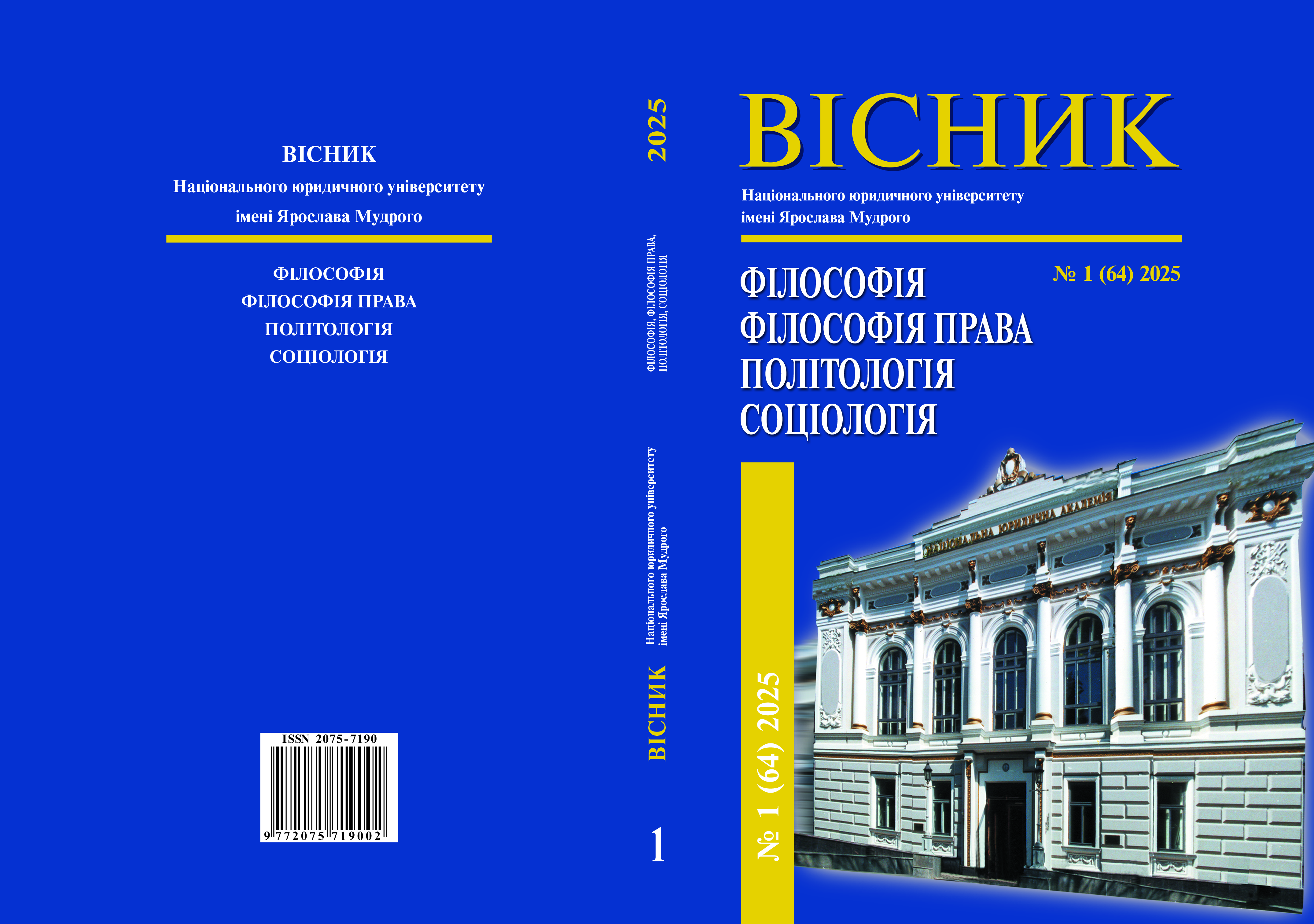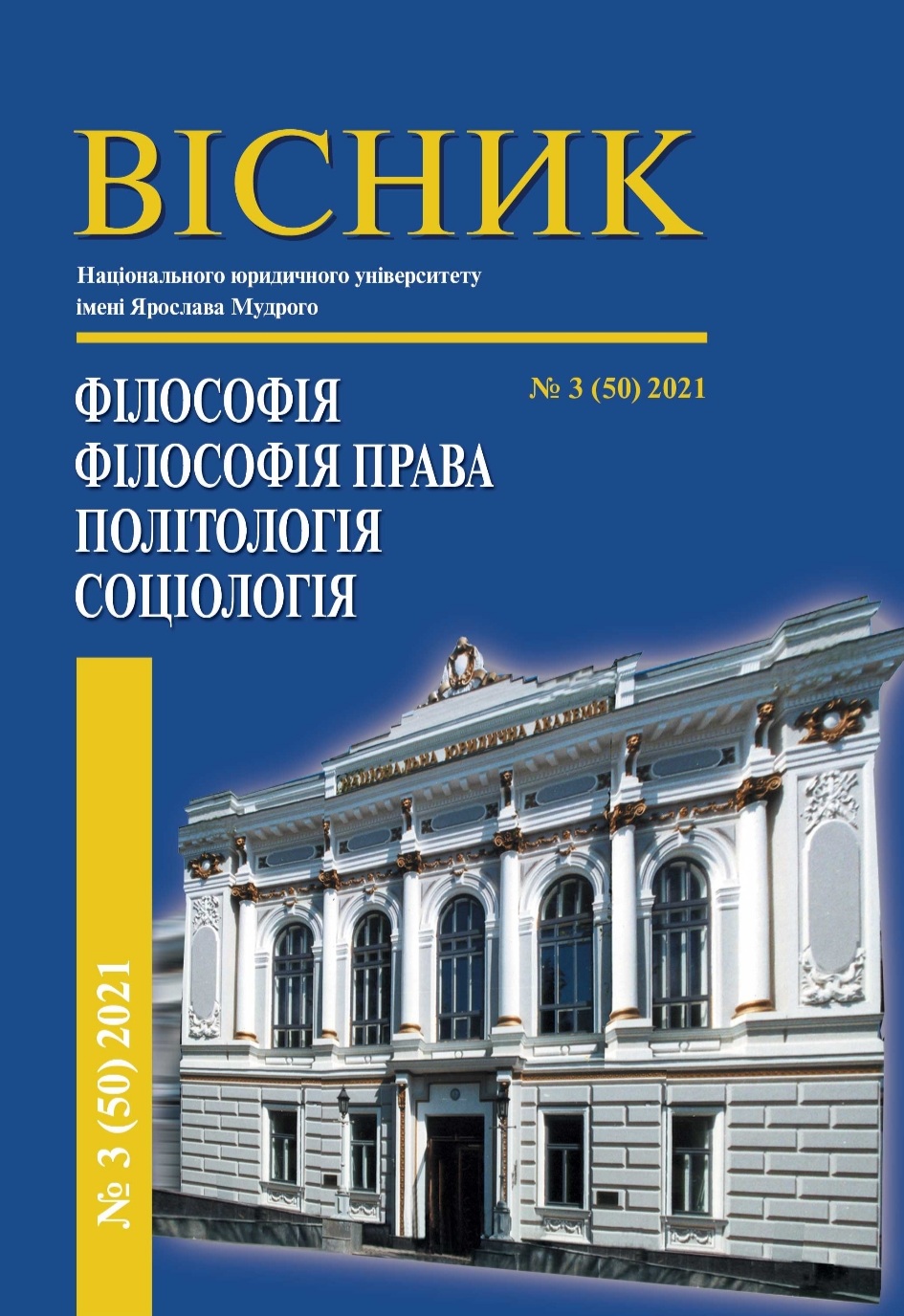НАРИС РОЗУМІННЯ МИСЛЕННЯ ХАННОЮ АРЕНДТ: ГАЙДЕГГЕРІВСЬКИЙ КОНТЕКСТ
DOI:
https://doi.org/10.21564/2663-5704.64.324506Ключові слова:
мислення, пізнання, онтологія, етика, політикаАнотація
Проаналізовано таке розуміння мислення, яке, на відміну від розрахунково-інструментального, є мисленням онтологічним, але той варіант, який розробляє Арендт, має інший вектор – якщо онтологічний характер мислення за Гайдеггером розкривається як відповідь людини на запитування буття, будучи способом самоздійснення буття, то Арендт експлікує онтологічний характер мислення як відповідальність людини, отже онтологія обертається етикою.
Посилання
Arendt, H. (1999). Stanovyshche liudyny. Lviv: Litopys [in Ukrainian].
Haidegger, M. (1998). Buttia v okoli rechei [Being around things]. Vozniak Taras. Teksty ta pereklady – Texts and translations. Kharkiv: Folio. URL: http://www.ji.lviv.ua/ji-library/Vozniak/text-i-perekl/kn3-heid2.htm (дата звернення: 30.03 2024) [in Ukrainian].
Arendt, H. (1981). The Life of the Mind. One-Volume Edition. San Diego: Harvest, Harcourt.
Arnau, J. (2023). Hannah Arendt, friendship in the face of totalitarianism. AUG 26. URL: https://english.elpais.com/culture/2023-08-26/hannah-arendt-friendship-in-the-face-of-totalitarianism.html (дата звернення: 30.03 2024).
Assy, B. (2006). Hannah Arendt and The Faculty of Thinking – A Partner to Think, a Witness to Act. Revista Ética & Filosofia Política, Vol. 9, 1. doi: https://doi.org/10.34019/2448-2137.2006.17850. URL: https://periodicos.ufjf.br/index.php/eticaefilosofia/article/view/17850. (дата звернення: 30.03 2024).
Czepiel, A. (2019). Dream Life in Hannah Arendt's. Zeszyty Naukowe Towarzystwa Doktorantów uj nauki humanistyczne, Vol.25/2, 7–33.
Degerman, D. (2019). Within the heart’s darkness: The role of emotions in Arendt’s political thought. European Journal of Political Theory, Vol.18 (2), 153–173. doi: 10.1177/1474885116647850.
Heidegger, M. (1968). What is called thinking. Translated by Gray, J. Glenn. New York: HarperPerennial.
Koishikawa, K. (2018). Thinking and Transcendence: Arendt’s Critical Dialogue with Heidegger. Tetsugaku: International Journal of Philosophical Association of Japan, Vol. 2, 83-99.
Mertel, K.C. (2020). M. Heidegger, Technology and Education. Journal of Philosophy of Education, Vol. 54, 2, 467–486. doi: https://doi.org/10.1111/1467-9752.12419.
Snir, I. (2020). Education and Thinking in Continental Philosophy: Thinking against the Current in Adorno, Arendt, Deleuze, Derrida and Rancière. New York: Springer.
Thinking like Hannah Arendt. (2021). Posted on 21st october. URL: HTTPS://REVDEM.CEU.EDU/2021/10/21/THINKING-LIKE-HANNAH-ARENDT/ (дата звернення: 30.03 2024).
Timmermann, M., Korsgaard, M., Aldinger, M. (2018). The Educator’s Diary: Arendt and Kierkegaard on Progressivism and the Educational Relation. Educational Theory, Vol. 68, 4-5. August/October, 381–583. doi: https://doi.org/10.1111/edth.12325.
Vlieghe, J., Zamojski, P. (2019). Out of Love for Some‐Thing: An Ontological Exploration of the Roots of Teaching with Arendt, Badiou and Scheler. Journal of Philosophy of Education, Vol. 53, 3 Special Issue: Love and Desire in Education, 518–530. doi: https://doi.org/10.1111/1467-9752.12375.
Vogel, L. (2008). The Responsibility of Thinking in Dark Times. Graduate Faculty Philosophy Journal, Vol. 29 (1), 253–273.
Voznyak, V.S., Lipin, N.V. (2020). Education like breach between past and future. Anthropological Measurements of Philosophical Research, 17, 98–109. doi: https://doi.org/10.15802/ampr.v0i17.206722.
Zembylas, М. (2022). Evil, thinking, and emotions in Hannah Arendt’s political philosophy: Implications for the teaching of democratic citizenship. Education, Citizenship and Social Justісе, Vol. 17, 1, 3–17. doi: https://doi.org/10.1177/1746197921995143.




